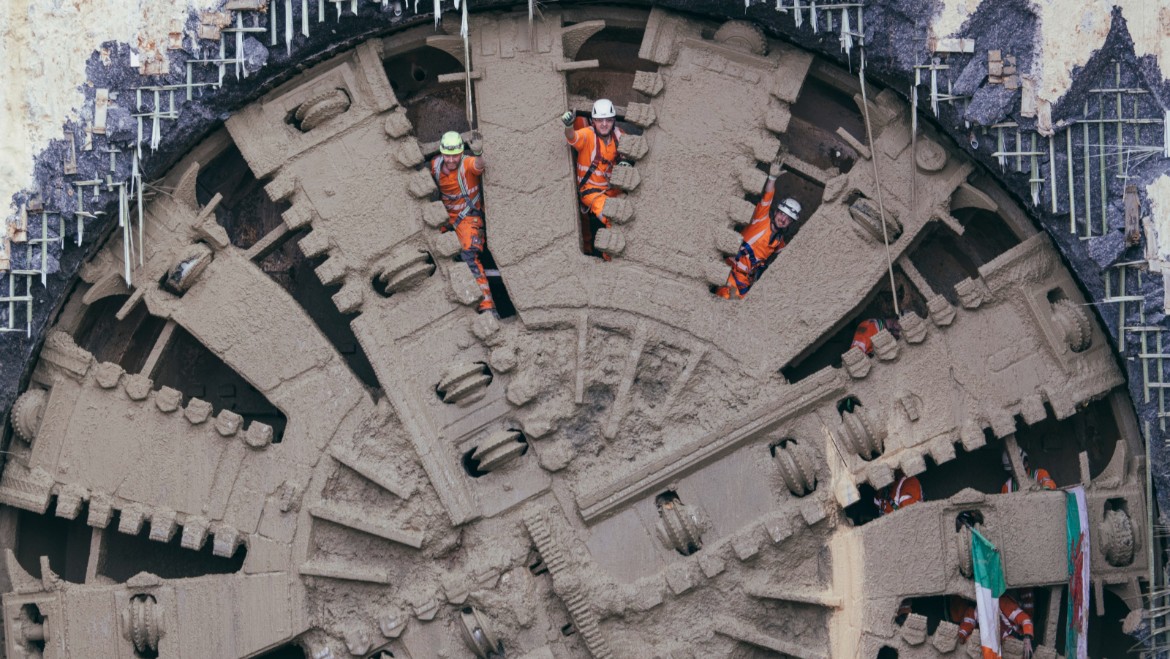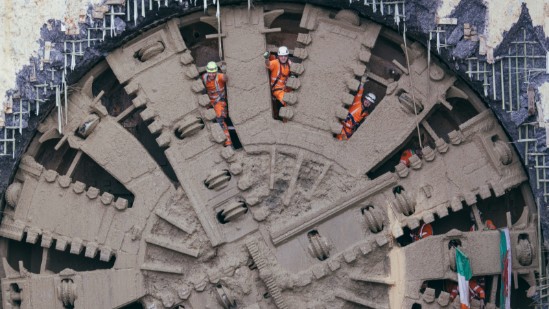The second giant boring machine (TBM) building HS2 under the Chiltern Hills broke through at the tunnel’s northern portal early evening yesterday, completing a journey that began in June 2021.
Named Cecilia, the TBM has driven for 10 miles underground to join twin sister machine – Florence. She arrived at the site near the Buckinghamshire town of Wendover on 27 February, after completing her adjacent tunnel drive.
Between them, the two 2,000 tonne machines have built the twin bore tunnel at depths of up to 80 metres and excavated three million cubic metres of chalk. Each machine operates like an underground factory, able to excavate the tunnels and line them with 56,000 pre-cast concrete tunnel segments, grouting them into place and moving forward at an average speed of 16 metres per day.
When HS2 is operational trains will travel through the Chiltern tunnel – the line’s longest – at speeds of up to 200mph, helping to almost halve journey times between Britain’s two largest cities.
The new high-speed line will relieve traffic the West Coast Mainline, freeing up space for more local services on the most crowded part of the important Victorian route. It will almost double rail capacity between London and the West Midlands, providing a more reliable service and driving economic growth.
HS2 Ltd’s head of civil works for this section of the route, Mark Clapp, said:
“Today is a remarkable achievement for all concerned. Cecelia’s arrival completes excavation of HS2’s 10-mile twin-bore tunnel, but it’s only the end of the first chapter in the story of building Britain’s high-speed railway under the Chiltern Hills.
“Several years of intensive, world class engineering lie ahead of us to complete the tunnels’ four ventilation shafts plus headhouses; install the mechanical and electrical plant and machinery, slab track and overhead electrical wires before trains begin passing through at 200mph.”
Both machines launched from the tunnel’s south portal, near the M25 motorway, were operated by HS2’s main works contractor, Align – a joint venture formed of three international infrastructure companies: Bouygues Travaux Publics, Sir Robert McAlpine, and VolkerFitzpatrick. The machines are made in Germany by TBM specialists Herrenknecht.
Align’s Underground Construction Director, Didier Jacques said:
“Ten miles is a long drive for a TBM, with a typical average being around three miles. The complexity and technically challenges of completing such a long drive for both our TBMs has been significant, however I am delighted that as a team, we have risen to the challenge.
“Both TBMs were designed in partnership with Herrenknecht and incorporate innovations and technologies that have been introduced on TBMs in the UK for the first time, to enhance performance and safety. This includes ‘semi-continuous boring’, allowing our TBMs to build the rings that line the tunnels without pausing.”
Each TBM is operated by a crew of around 17, working in shifts to keep the machines running when required 24/7. They are supported by over 100 people on the surface, managing the logistics and maintaining the smooth progress of the tunnelling operation.
In total over 450 people have worked on the tunnels over the last three years, including a dedicated production team who made 112,000 precision-engineered, fibre-reinforced concrete tunnel wall segments on site at a purpose build temporary factory - and a team processing the spoil from the tunnels.
Completion of tunnelling under the Chilterns follows recent publication of HS2 Ltd research showing how high-speed line’s arrival in the West Midlands will give a £10 billion economic boost over the next decade, with new development around its stations at Birmingham’s Curzon Street and near the city’s airport and the NEC.
ENDS
Notes to editors:
- HS2 is Britain’s new high-speed rail line. Once complete, it will almost halve the journey time between London Euston and Birmingham to just 49 minutes, with trains running north via the existing rail network to destinations such as Manchester, Liverpool and Glasgow.
- The railway is the most effective long-term solution to capacity constraints on the congested southern end of the West Coast Main Line, almost doubling capacity to up to 250,000 seats per day. Putting intercity trains on a dedicated high-speed line between London and Birmingham releases space on the existing railway for more local, regional and freight services.
- HS2, which is due to open between 2029 and 2033, is now at peak construction. Work has started on two-thirds of viaducts, the breakthrough of the route’s longest tunnel has been completed and major stations are taking shape.
- The project is a catalyst for economic growth by fuelling redevelopment around our major new stations in London and the West Midlands – opening employment, housing and leisure opportunities. Research shows £10bn of redevelopment is already being delivered around HS2’s sites in the West Midlands alone.
- Unlike the existing rail network, much of which dates from the Victorian age, HS2 is being built from day one to the highest engineering standards and designed for extreme weather conditions. Real-time sensors will be embedded into the infrastructure to prevent failure, creating a new benchmark for punctuality and reliability.
- Passengers will benefit from an unrivalled 21st century journey experience on HS2’s British-built trains, including seamless mobile coverage, ensuring uninterrupted streaming and calls along the entire route.
- All HS2 trains will be powered with zero carbon electricity from day one of operation and we are working to significantly reduce the amount of embedded carbon in construction.
- HS2’s construction is supporting jobs across the country. Over 3,200 UK-based businesses are in our supply chain and more than 28,000 people are helping to deliver our construction programme.
- HS2 is delivering the country’s largest environment programme, planting seven million trees and shrubs over an area of 33 square kilometres – an increase of around 30% compared with the status quo.
- Download a range of images showing construction progress on site and how our railway will look when complete. (credit: HS2 Ltd).

